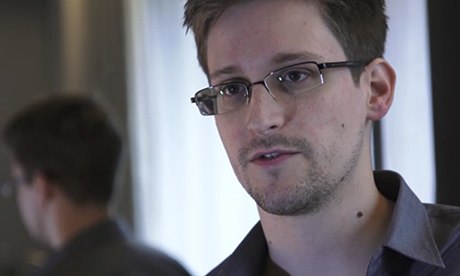Two Norwegian politicians say NSA whistleblower’s actions have led to a ‘more stable and peaceful world order’
Associated Press in Stavanger – theguardian.com, Wednesday 29 January 2014

Two Norwegian politicians say they have jointly nominated the former National Security Agency contractor Edward Snowden for the 2014 Nobel peace prize.
The Socialist Left party politicians Baard Vegar Solhjell, a former environment minister, and Snorre Valen said the public debate and policy changes in the wake of Snowden’s whistleblowing had “contributed to a more stable and peaceful world order”.
Being nominated means Snowden will be one of scores of names that the Nobel committee will consider for the prestigious award.
The five-member panel will not confirm who has been nominated but those who submit nominations sometimes make them public.
Nominators, including members of national parliaments and governments, university professors and previous laureates, must enter their submissions by 1 February.
The prize committee members can add their own candidates at their first meeting after that deadline.
http://www.theguardian.com/world/2014/jan/29/edward-snowden-nominated-nobel-peace-prize
~~~
12 People Who Should Not Have Won The Nobel Peace Prize
Rob Wile – October 10, 2013
[...]Carl von Ossietzky* (1935)
*Here is an instance when the right guy got the right award, but the committee itself acted shamefully. Von Ossietzky, a writer and pacifist, helped expose Germany’s secret rearmament in violation of the Versailles treaty. Two members of the Nobel committee resigned over the decision and Hitler had him arrested and shipped to a concentration camp.
Nobody (1948)
The rules of the Nobel Prize are kind of odd. There’s a provision for not awarding the prize when no one meets its criteria, and as you’ll see as you read through this post, they should probably be invoking it way more frequently.
But 1948 was an instance when there was an obvious candidate who was somehow ignored: That year, Mahatma Gandhi, who led India’s non-violent movement for independence, was assassinated. He’d been nominated 12 times previously, but shunned. Another Nobel rule says the recipient must be living, and the committee did not see fit to make an exception in this case.
The committee has since bent over backward for the omission. In 2006, remarks attributed to the head of the committee basically prove the argument of this post: “Gandhi could do without the Nobel Peace Prize, whether Nobel committee can do without Gandhi is the question.”
Henry Kissinger and Le Duc Tho** (1973)
The Paris Peace agreement had nominally set terms for an end to the Vietnam War by initiating a ceasefire. And it’s true that American forces began leaving. But earlier that year, the U.S.’ secret bombing campaign against Cambodia, which killed hundreds of thousands of people and which Kissinger spearheaded, had been revealed.
**Le Duc Tho, Ho Chi Minh’s successor as Vietnam Communist Party head, at least had the sense to decline accepting the prize.
Yasser Arafat, Shimon Peres and Yitzakh Rabin (1994)
Another example of the prize’s shortsightedness. The Oslo accords seemed like a good idea at the time, but they merely proved another temporary stopgap in what remains the world’s longest-running conflict.
Kofi Annan and the United Nations (2001)
If the U.N. seems particularly feckless today, one can make an argument that Annan expedited its decline in relevancy when he was investigated in 2004 for improperly steering Iraq arms-for-food program contracts to his son. Although he was technically cleared, it still “indicated that Annan may have initially misled investigators about contacts he had with senior executives at his son’s company before they won a U.N. contract,” according to the Washington Post.
And it’s now difficult not to wince at the citation itself, which recognizes Annan and the U.N. itself for “work for a better organized and more peaceful world.”
Wangari Muta Maathai (2004)
Maathai was a lifelong democracy and environmental activist who helped advance political rights and sustainable development in Kenya and East Africa. Yet she maintained odd views about the origins of HIV:
“Like many others I wonder about the theories on the origin, nature and behaviour of the virus. I understand that there is consensus among scientists and researchers internationally that the evolutionary origin most likely was in Africa even though there is no final evidence. I am sure that the scientists will continue their search for concluding evidence so that the view, which continues to be quite widespread that the tragedy could have been caused by biological experiments that failed terribly in a laboratory somewhere, can be put to rest.”
Barack Obama (2009)
Obama himself suggested he was undeserving of the award, and it seems like another example of a year when the committee should have just punted….
Read more: http://www.businessinsider.com/12-worst-nobel-peace-prize-winners-2013-10#ixzz2ro9OWQaY
.
I’m not so sure it’s an honor anymore. Obama the drone and global pro-baby killer getting one should taint it forever.
